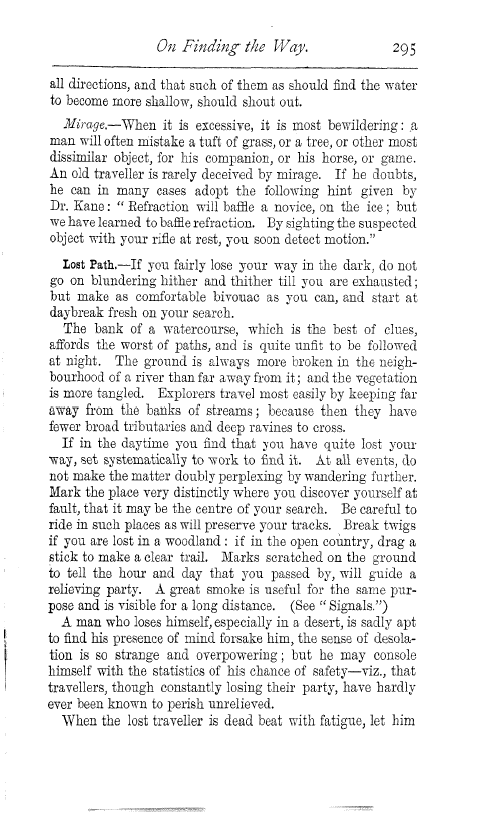On Finding the Way. 295
all directions, and that such of them as should find the water to become more shallow, should shout out.
Mirage.-When it is excessive, it is most bewildering : a man will often mistake a tuft of grass, or a tree, or other most dissimilar object, for his companion, or his horse, or game. An old traveller is rarely deceived by mirage. If he doubts, he can in many cases adopt the following hint given by Dr. Kane : " Refraction will baffle a novice, on the ice ; but we have learned to baffle refraction. By sighting the suspected object with your rifle at rest, you soon detect motion."
Lost Path.-If you fairly lose your way in the dark, do not go on blundering hither and thither till you are exhausted ; but make as comfortable bivouac as you can, and start at daybreak fresh on your search.
The bank of a watercourse, which is the best of clues, affords the worst of paths, and is quite unfit to be followed at night. The ground is always more broken in the neighbourhood of a river than far away from it; and the vegetation is more tangled. Explorers travel most easily by keeping far away from the banks of streams ; because then they have fewer broad tributaries and deep ravines to cross.
If in the daytime you find that you have quite lost your way, set systematically to work to find it. At all events, do not make the matter doubly perplexing by wandering further. Mark the place very distinctly where you discover yourself at fault, that it may be the centre of your search. Be careful to ride in such places as will preserve your tracks. Break twigs if you are lost in a woodland : if in the open country, drag a stick to make a clear trail. Marks scratched on the ground to tell the hour and day that you passed by, will guide a relieving party. A great smoke is useful for the same purpose and is visible for a long distance. (See " Signals.")
A man who loses himself, especially in a desert, is sadly apt to find his presence of mind forsake him, the sense of desolation is so strange and overpowering ; but he may console himself with the statistics of his chance of safety-viz., that travellers, though constantly losing their party, have hardly ever been known to perish unrelieved.
When the lost traveller is dead beat with fatigue, let him

